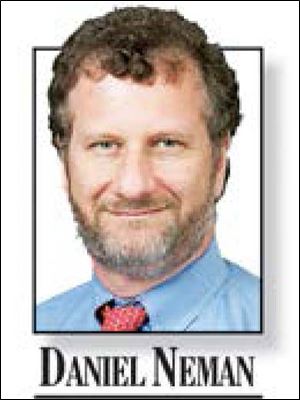
COMMENTARY
Drawing lines with zucchini
This just in: Zucchini bread is not a vegetable
7/29/2013
This just in: Zucchini bread is not a vegetable.
Of course, it is tempting to think of it as somehow healthy, and many people do justify eating zucchini bread because of all of the beneficial vitamins and minerals in zucchini. But to put it frankly, zucchini bread is more bread than zucchini.
In fact, to get the benefits of one full serving of zucchini, you would have to eat half of an entire loaf of it. As the Ohio State University Extension puts it, “that’s not recommended.”
But, the extension service continues, there are ways to lessen the damage and reduce the number of calories from 260 per slice (with chocolate and almonds) down to 87 calories per slice (low fat, low calorie, and, I’m guessing, low flavor).
The easiest and most effective way to cut the calories in it is to substitute an equal amount of applesauce for the oil, if your recipe calls for oil. Half a cup of oil contains 955 calories, but half a cup of unsweetened applesauce only has 50.
Cutting back on the sugar by about one-quarter will save almost 200 calories per cup. The extension service also recommends using liquid egg substitute or egg whites instead of whole eggs, but you have to draw a line somewhere, and that’s where I draw mine.
Meanwhile, in other news on the weight-loss front, scientists at University College London have identified a gene (or rather, a genetic flaw) that makes fatty foods seem more tempting to some people.
As reported by the BBC, Dr. Rachel Batterham, the head of the school’s Centre for Obesity Research, said some people are “biologically programmed to eat more.”
Here’s how it works. A gene called FTO has been linked to a tendency toward obesity. The gene comes in two types — one with a high risk for obesity, and one with a low risk. If you get a high-risk gene from each parent, then you are 70 percent more likely to become obese than people with low-risk genes.
The scientists have now learned that there is a connection between the FTO gene and a hormone called ghrelin, which is what makes people feel hungry. They think the high-risk gene might have developed long ago, when it was necessary for humans to eat a lot of food before a harsh winter.
And in yet another skirmish in the battle against weight gain, the folks at Livestrong have come up with a list of 18 foods with a negative reputation that are actually good for you.
Except some of them aren’t.
Pasta, they say, is surprisingly healthy. It keeps you feeling fuller, longer, and it has a low glycemic index. That means you don’t feel a sugar drop shortly after eating it.
So what about that sugar drop you sometimes feels after eating pasta? That is because you have eaten too much of it, they say. The recommended portion of pasta is one-half cup, or, as they themselves put it, “the amount you can hold in one cupped hand.” The Livestrong folks suggest eating one cup, or half of the typical American portion.
In other words, it’s good for you as long as you don’t eat much of it.
And that seems to be the theory for a lot of the foods on the list. Avocados, they say, boast “more than 20 essential vitamins, minerals, and phylonutrients,” which all sounds very healthy. But they also have an average of 322 calories apiece, and large ones can run 400 calories. A Snickers bar, in comparison, contains 273 calories — plus significant amounts of certain vitamins and minerals.
Dark chocolate, they say, decreases LDL cholesterol, reduces the risk of blood clots, and improves cognitive performance in the elderly. But, they warn, “stick with 1-2 ounces per day or else you may have the unwanted side effect of eating too much: weight gain.”
Yes, but if you eat two ounces of chocolate every day without adjusting the rest of your routine, you will gain 32 pounds each year — and that far outweighs any potential problems with cholesterol or blood clots.
That’s the problem with half-considered lists such as these. Don’t eat a lot of chocolate because it’s good for you. Don’t make it your zucchini bread.
Contact Daniel Neman at dneman@theblade.com or 419-724-6155.